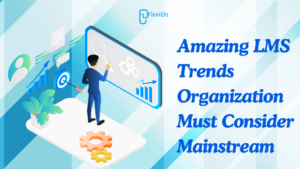
In today’s fast-paced corporate environment, the need for continuous learning and development is more pressing than ever. Organizations must adapt quickly to changing market conditions, new technologies, and evolving employee expectations. Learning Management Systems (LMS) play a pivotal role in addressing these challenges, offering a centralized platform for training and development initiatives.
This blog will explore the critical importance of LMS in the corporate world, along with some emerging trends that can further enhance their effectiveness.
The Learning Management System not only supports employee training and development but also enhances organizational efficiency and agility. Below are key reasons why LMS plays a crucial role in the corporate world, along with some emerging trends that further amplify their impact.
Integration of Artificial Intelligence
AI has made significant inroads into various sectors, yet its application within LMS remains largely underexplored. The potential of AI lies in its ability to facilitate personalized learning experiences through adaptive learning technologies. By analyzing data on individual learner behaviors, AI-driven LMS can tailor content recommendations, pacing, and assessment methods. The incorporation of AI also enhances automated administrative tasks, such as grading and feedback, allowing instructional designers and educators to dedicate more time to content creation and learner engagement.
Moreover, AI chatbots are increasingly being utilized as virtual learning assistants, providing learners with on-demand support and information retrieval. This trend allows organizations to provide real-time assistance to employees, ensuring they can overcome learning obstacles swiftly without reliance on human instructors.
Augmented and Virtual Reality Experiences
Although augmented reality (AR) and virtual reality (VR) have made notable appearances in corporate training, many organizations still perceive these technologies as peripheral rather than essential elements of their LMS. AR and VR can transform traditional training modalities by delivering immersive experiences that engage learners in ways that text and video cannot replicate. For example, virtual simulations allow employees to practice complex procedures and scenarios in a safe environment, developing practical skills without the risks associated with live training.
As organizations continue to adopt remote work models, the demand for virtual onboarding programs has surged. Improving AR and VR tools for immersive onboarding experiences can reduce the learning curve for new hires significantly, as they are guided through interactive environments that mimic real-life job settings.
Data Analytics and Learning Insights
Data analytics has become a cornerstone of informed decision-making in numerous fields, yet its potential in the realm of corporate learning is still being realized. Many organizations collect learner data; however, they often lack the analytical tools and skills necessary to translate this data into actionable insights. Modern LMS platforms increasingly offer advanced analytics capabilities that enable organizations to assess learner engagement, retention rates, and skill progression.
By leveraging comprehensive data analytics, companies can identify knowledge gaps within their workforce and tailor their training programs accordingly. Predictive analytics can further enhance this trend by anticipating future training needs based on current performance metrics, ensuring a proactive approach to employee development.
Emphasis on Soft Skills Development
While technical skills are undoubtedly critical in today’s corporate environment, soft skills such as communication, collaboration, adaptability, and emotional intelligence are gaining prominence. Employees with strong soft skills are often more effective in their roles, contributing positively to team dynamics and organizational culture. However, traditional LMS have focused primarily on hard skills, leaving a void in soft skills training.
Emerging LMS trends indicate a growing emphasis on integrating soft skills training into corporate learning frameworks. This trend often manifests as the development of workshops, role-playing exercises, and scenario-based learning modules designed to cultivate interpersonal skills. Organizations that prioritize soft skills in their training initiatives foster an adaptable and communicative workforce, ready to meet the complexities of contemporary business challenges.
Microlearning as a Primary Learning Strategy
Though microlearning has gained traction, it is often incorporated as a supplementary approach rather than a primary learning strategy within corporate LMS. Microlearning entails breaking down complex learning content into bite-sized modules, enabling employees to absorb information more thoroughly and efficiently. This trend aligns perfectly with the modern preference for on-demand, just-in-time learning experiences, where employees can access targeted content precisely when they require it.
Integrating microlearning into the corporate training ecosystem ensures that learners can quickly refresh their knowledge and skills without the need for lengthy training sessions. As the workforce increasingly demands flexibility and personalization, leveraging microlearning as a foundational strategy can lead to higher retention rates, improved engagement, and a more skilled workforce.
Social Learning Integration
The importance of peer-to-peer interaction in learning contexts is well-established, yet many corporate LMS overlook the incorporation of social learning elements. Social learning harnesses the power of collaboration and knowledge sharing among employees, creating a community-driven approach to skill development. Features such as discussion forums, peer mentoring, and collaborative projects can be integrated into LMS platforms to foster an environment of collective learning.
By creating opportunities for employees to engage with one another, organizations can enhance the learning experience and spark innovation through diverse perspectives. Furthermore, social learning contributes to a sense of belonging among employees, leading to improved morale and job satisfaction.
Continuous Learning and Development Culture
In an era characterized by rapid technological advancements and evolving market demands, the concept of lifelong learning has gained paramount importance. While some organizations view training as a periodic requirement, there is a shift toward fostering a culture of continuous learning and development. This cultural shift places training as an ongoing endeavor, pivotal for long-term employee growth and organizational success.
LMS platforms that support continuous learning often include features such as continuous performance feedback mechanisms, learning pathways that evolve with new skills, and resources that encourage exploration beyond the formal curriculum. By prioritizing a culture of continuous learning, organizations position themselves as adaptable, forward-thinking entities prepared to thrive in an ever-transforming corporate landscape.
Traditional Method of LMS
- One of the primary functions of an LMS is to standardize and streamline the training process across an organization. It enables companies to deliver consistent and engaging training materials to employees, regardless of their location. This uniformity ensures that every team member receives the same foundational knowledge, helping to maintain a cohesive corporate culture.
- One of the primary functions of an LMS is to standardize and streamline the training process across an organization. It enables companies to deliver consistent and engaging training materials to employees, regardless of their location. This uniformity ensures that every team member receives the same foundational knowledge, helping to maintain a cohesive corporate culture.
- An LMS is invaluable for onboarding new employees. Instead of lengthy, in-person orientation sessions, organizations can utilize their LMS to provide a structured onboarding process. New hires can access essential information, training modules, and company policies at their convenience, enabling them to acclimate to their roles more quickly and effectively.
Conclusion
As corporate training needs evolve, so must the tools and methodologies employed by organizations to facilitate learning and development. By adopting innovative approaches such as artificial intelligence, AR and VR, data analytics, soft skills development, microlearning, social learning, and a continuous learning culture, organizations can redefine their training strategies and create a future-ready workforce. As corporate leaders, it is essential to recognize and harness the potential of these emerging LMS trends, transforming learning from a routine exercise into a dynamic and integral component of organizational success.

